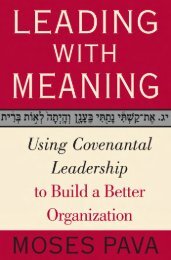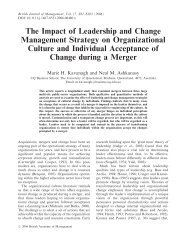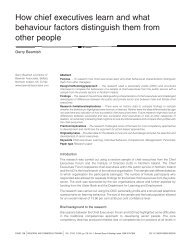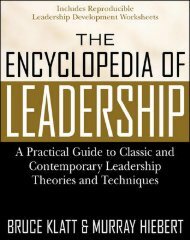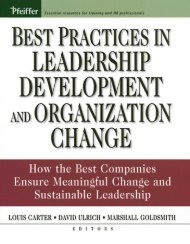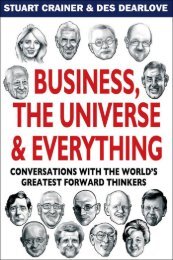Develop your leadership skills- John Adair. -- 2nd ... - About University
Develop your leadership skills- John Adair. -- 2nd ... - About University
Develop your leadership skills- John Adair. -- 2nd ... - About University
You also want an ePaper? Increase the reach of your titles
YUMPU automatically turns print PDFs into web optimized ePapers that Google loves.
C R E A T I N G S U C C E S S<strong>Develop</strong> YourLeadership Skills• Know theessential qualities• Learn about therole• Master the key<strong>skills</strong><strong>John</strong> <strong>Adair</strong>
Publisher’s noteEvery possible effort has been made to ensure that the information contained in thisbook is accurate at the time of going to press, and the publishers and author cannotaccept responsibility for any errors or omissions, however caused. No responsibility forloss or damage occasioned to any person acting, or refraining from action, as a resultof the material in this publication can be accepted by the editor, the publisher or theauthor.First published in Great Britain and the United States in 2007 by Kogan Page LimitedReprinted 2007Apart from any fair dealing for the purposes of research or private study, or criticism orreview, as permitted under the Copyright, Designs and Patents Act 1988, this publicationmay only be reproduced, stored or transmitted, in any form or by any means, withthe prior permission in writing of the publishers, or in the case of reprographic reproductionin accordance with the terms and licences issued by the CLA. Enquiriesconcerning reproduction outside these terms should be sent to the publishers at theundermentioned addresses:120 Pentonville Road 525 South 4th Street, #241London N1 9JN Philadelphia PA 19147United KingdomUSAwww.kogan-page.co.uk© <strong>John</strong> <strong>Adair</strong>, 2007The right of <strong>John</strong> <strong>Adair</strong> to be identified as the author of this work has been asserted byhim in accordance with the Copyright, Designs and Patents Act 1988.ISBN-10 0 7494 4919 5ISBN-13 978 0 7494 4919 3The views expressed in this book are those of the author, and are not necessarily thesame as those of Times Newspapers Ltd.British Library Cataloguing-in-Publication DataA CIP record for this book is available from the British Library.Library of Congress Cataloging-in-Publication Data<strong>Adair</strong>, <strong>John</strong> Eric, 1934-<strong>Develop</strong> <strong>your</strong> <strong>leadership</strong> <strong>skills</strong> / <strong>John</strong> <strong>Adair</strong>. -- <strong>2nd</strong> ed.p. cm.ISBN-13: 978-0-7494-4919-3ISBN-10: 0-7494-4919-51. Leadership. I. Title.HD57.7.A2746 2007658.4'092--dc222006034792Typeset by Jean CussonsTypesetting, Diss, NorfolkPrinted and bound in Great Britain by MPG Books Ltd, Bodmin, Cornwall
Contents<strong>About</strong> the authorviiIntroduction 11. What you have to be 3Some essential qualities 5; Generic <strong>leadership</strong>traits 62. What you have to know 113. What you need to do 17Task need 19; Team maintenance need 19;Individual needs 20; The three circles interact 20;Towards the functional approach to <strong>leadership</strong> 21;Your role as leader 22; Leadership: personalreminder 24
vi ■ Contents4. How to turn the core <strong>leadership</strong> functions 25into <strong>skills</strong>Defining the task 26; Planning 30; Briefing 33;Controlling 36; Evaluating 39; Motivating 41;Organising 46; Providing an example 525. How to develop <strong>your</strong>self as a leader 57Be prepared 58; Be proactive 59; Be reflective 596. How to lead at the strategic level 63The functions of a strategic leader 64; Theimportance of practical wisdom 65; Leadershipfor desirable change 677. How to grow leaders in <strong>your</strong> organisation 69Principle one: develop a strategy for <strong>leadership</strong>development 70; Principle two: selection 71;Principle three: training for <strong>leadership</strong> 72; Principlefour: career development 73; Principle five: linemanagers as <strong>leadership</strong> developers 74; Principle six:culture 75; Principle seven: the chief executive 76;Finding greatness in people 76Appendix: A <strong>leadership</strong> checklist 79Further reading 83Index 85
<strong>About</strong> the author<strong>John</strong> <strong>Adair</strong> is the world’s leading authority on <strong>leadership</strong> and<strong>leadership</strong> development. Over a million managers worldwidehave taken part in the action-centred <strong>leadership</strong> programmeshe pioneered.<strong>John</strong> had a colourful early career. He served as a platooncommander in the Scots Guards in Egypt, and then became theonly national serviceman to serve in the Arab Legion, where hebecame adjutant of the Bedouin regiment. He was virtually incommand of the garrison of Jerusalem in the front line for sixweeks. After national service he qualified as a deckhand in Hulland sailed an Arctic steam trawler to Iceland. He then workedas an orderly in the operating theatre of a hospital.After being senior lecturer in military history and adviser in<strong>leadership</strong> training at the Royal Military Academy Sandhurst,and Associate Director of the Industrial Society, in 1979 <strong>John</strong>
viii ■ <strong>About</strong> the authorbecame the world’s first Professor of Leadership Studies at the<strong>University</strong> of Surrey.Between 1981 and 1986 <strong>John</strong> worked with Sir <strong>John</strong> Harvey-Jones at ICI, introducing a <strong>leadership</strong> development strategythat helped to change the loss-making, bureaucratic giant intothe first British company to make £1 billion profit.<strong>John</strong> has written over 40 books, translated into manylanguages. Recent titles include How to Grow Leaders andEffective Leadership <strong>Develop</strong>ment. Apart from being anauthor, he is also a teacher and consultant.From St Paul’s School he won a scholarship to Cambridge<strong>University</strong>. <strong>John</strong> holds the higher degrees of Master of Lettersfrom Oxford <strong>University</strong> and Doctor of Philosophy from King’sCollege London, and he is also a Fellow of the Royal HistoricalSociety. Recently the People’s Republic of China awarded himthe title of Honorary Professor in recognition of his‘outstanding research and contribution in the field ofLeadership’.
IntroductionLeadership <strong>skills</strong> have now been universally recognised as a keyingredient – some would say the key ingredient – in management.A good manager is now by definition a leader. Equally, agood leader will also be a manager.But how do you become such a leader? Is it possible to develop<strong>your</strong> own abilities as a leader? Let me answer that last questionwith a resounding YES. As for the first question, this wholebook is my answer. It is a simple practical guide for anyonewho is about to take up a team <strong>leadership</strong> role in any organisation.But I hope that it will be equally useful for those alreadyin such roles who wish to improve their basic <strong>leadership</strong> <strong>skills</strong>.If <strong>leadership</strong> matters to you, this book will give you a completeframework for becoming an effective leader.One word of caution: nobody can teach you <strong>leadership</strong>. Itis something you have to learn. You learn principally from
2 ■ <strong>Develop</strong> <strong>your</strong> <strong>leadership</strong> <strong>skills</strong>experience. But experience or practice has to be illuminated byprinciples or ideas. It is when the sparks jump between the twothat learning happens. So you will have to think hard, relatingwhat I say to <strong>your</strong> experience as you read and reflecting on it.As with everything else in life, the more you put into this jointexploration of practical <strong>leadership</strong>, the more you will get out ofit.Let me add a bold claim for this short book. People oftendebate the differences and similarities of <strong>leadership</strong> andmanagement. But the majority of practical people are interestedprimarily in what they have to do, and not whether itshould be labelled ‘<strong>leadership</strong>’ or ‘management’ or both. As aChinese proverb says, ‘What does it matter if a cat is black orwhite, as long as it catches mice?’ This is the book for suchleaders. It is the first really successful synthesis of the conceptsof <strong>leadership</strong> and management. At last there is a single integratedvision, a focus that encompasses both perspectives.
1What you haveto beLet’s start with the most basic question of all: why is it that oneperson rather than another emerges, or is accepted, as a leaderwithin a group? In other words, what is <strong>leadership</strong>? The reasonfor starting here is that becoming clearer about the nature androle of <strong>leadership</strong> is the biggest step that you can take towardsimproving <strong>your</strong> own <strong>leadership</strong> <strong>skills</strong>. In the box overleaf, giveup to five responses to that question.
4 ■ <strong>Develop</strong> <strong>your</strong> <strong>leadership</strong> <strong>skills</strong>What is <strong>leadership</strong>?1. ____________________________________________________2. ____________________________________________________3. ____________________________________________________4. ____________________________________________________5. ____________________________________________________One traditional answer to that question – which may bereflected in what you have written in the box – is that theperson in mind has certain <strong>leadership</strong> qualities. These traits,such as courage or tenacity, tend to make people leaders in allcircumstances. They are natural or born leaders.There are two difficulties to this approach. First, if youcompare all the lists of <strong>leadership</strong> qualities available in studiesor books on the subject, you will notice considerable variations.That is not surprising, because there are over 17,000words in the English language that describe personality andcharacter. Secondly, the assumption that leaders are born andnot made is not going to help you much. Remember that youngperson whose annual report stated that ‘Smith is not a bornleader yet’! Moreover, this assumption is not true. Naturally wedo differ in terms of our potential for <strong>leadership</strong>, but potentialcan – and should – be developed. If you work really hard at<strong>leadership</strong>, <strong>your</strong> <strong>skills</strong> will become more habitual or unconscious.Then people will call you a natural leader.
What you have to be ■ 5Some essential qualitiesYou cannot leave personality and character out of <strong>leadership</strong>.There are some qualities that you have to have. Basically youshould possess, exemplify and perhaps even personify the qualitiesexpected or required in <strong>your</strong> working group. I haveemphasised that because it is so fundamental. Without it youwill lack credibility. (Incidentally, here is one of the first differencesbetween leaders and managers: the latter can beappointed over others in a hierarchy regardless of whether ornot they have the required qualities.)ExerciseYou may like to take some paper and make a list of the five or sixqualities expected in those working in <strong>your</strong> field. Check it out withcolleagues. Having done this exercise myself many times – forexample, with production workers, sales staff, nurses, engineers andaccountants – I expect that you will not find it too difficult. Notice thatwords may vary – ‘hard-working’ and ‘industrious’, for example – butthe concepts of the traits, qualities or abilities remain the same.These qualities are necessary for you to be a leader, but they arenot in themselves sufficient to make you be seen as one. Forexample, you cannot be a military leader without physicalcourage. But there are plenty of soldiers with physical couragewho are not leaders – it is a military virtue. So what other qualitiesdo you need?
6 ■ <strong>Develop</strong> <strong>your</strong> <strong>leadership</strong> <strong>skills</strong>Generic <strong>leadership</strong> traitsYou will have noticed that these qualities are very muchanchored in particular fields. There may well be somecommonality, but certainly the degrees to which the qualitiesare required will vary considerably. There are, however, somemore generic or transferable <strong>leadership</strong> qualities that youshould recognise in <strong>your</strong>self – you will certainly see them inother leaders. They are set out in the box below.Qualities of <strong>leadership</strong> – across theboard■ Enthusiasm. Can you think of any leader who lacks enthusiasm?It is very hard to do so, isn’t it?■ Integrity. This is the quality that makes people trust you. Andtrust is essential in all human relationships – professional orprivate. ‘Integrity’ means both personal wholeness andadherence to values outside <strong>your</strong>self – especially goodnessand truth.■ Toughness. Leaders are often demanding people, uncomfortableto have around because their standards are high. Theyare resilient and tenacious. Leaders aim to be respected, butnot necessarily popular.■ Fairness. Effective leaders treat individuals differently butequally. They do not have favourites. They are impartial ingiving rewards and penalties for performance.■ Warmth. Cold fish do not make good leaders. Leadershipinvolves <strong>your</strong> heart as well as <strong>your</strong> mind. Loving what youare doing and caring for people are equally essential.
What you have to be ■ 7■ Humility. This is an odd quality, but characteristic of the verybest leaders. The opposite to humility is arrogance. Whowants to work for an arrogant manager? The signs of agood leader are a willingness to listen and a lack of an overweeningego.■ Confidence. Confidence is essential. People will sensewhether or not you have it. So developing self-confidence isalways the preliminary to becoming a leader. But don’t let itbecome overconfidence, the first station on the track leadingto arrogance.Some readers may question the inclusion of integrity in this list.Are there not good leaders, such as Adolf Hitler, who totallylacked integrity? There is a useful distinction between goodleaders and leaders for good. Whether or not Hitler was a goodleader is a debatable matter – in some respects he was and inothers he was not – but he was certainly not a leader for good.But this is all a bit academic. For <strong>leadership</strong> that does not reston the bedrock of integrity does not last: it always collapses,and usually sooner rather than later. Why? Because that is theway of human nature.You can see that what you are is an important strand in <strong>your</strong><strong>leadership</strong>. Remember the Zulu proverb, ‘I cannot hear whatyou are saying to me because you are shouting at me.’ Thisstrand in <strong>your</strong> <strong>leadership</strong> is also one of the three main paths upthe mountain, the three lines of answering those core questions‘What is <strong>leadership</strong>?’ and ‘Why does one person rather thananother emerge as the leader in a group?’ (The other twoapproaches are considered in Chapters 2 and 3.)
8 ■ <strong>Develop</strong> <strong>your</strong> <strong>leadership</strong> <strong>skills</strong>Now, you can develop all these qualities. You can build <strong>your</strong>self-confidence, discover new wells of enthusiasm and grow inintegrity. But it all takes time. It is better to start on one of theother two paths up the mountain. Although, having said that, Iwould counsel you to return to the qualities approach fromtime to time. Review <strong>your</strong> progress as the profile of <strong>your</strong>strengths and weaknesses (in terms of personality and character)begins to unfold and change in the positive direction.Always remain open to feedback on that score, howeverpainful it may be (I speak from experience!).In testing whether or not you have the basic qualities of <strong>leadership</strong>,you should ask <strong>your</strong>self the questions in the followingchecklist.Checklist to test qualitiesYesNoDo I possess the above-mentioned seven qualities?(This ‘test’ will subsequently reveal whether or not you really do!)Have I demonstrated that I am a responsible person?Do I like the responsibility and the rewards of <strong>leadership</strong>?Am I well known for my enthusiasm at work? Have I ever been described as having integrity? Can I show that people think of me as a warm person?
What you have to be ■ 9Am I an active and socially participative person? Do I have the self-confidence to take criticism, indifference and/or unpopularity from others?Can I control my emotions and moods or do I let them control me?Have I been dishonest or less than straight with people who work for me over the past six months?Am I very introvert or very extrovert (or am I an ambivert – mixture of both – as leadersshould be)?
2What you haveto knowAnother approach to <strong>leadership</strong> plays down the idea that thereare such things as generic <strong>leadership</strong> qualities. It stresses theidea that <strong>leadership</strong> depends on the situation. In some situationsone person may emerge as the leader; in others he or shemay not. Winston Churchill, for example, was a great leader inwartime, but not so good in peace.As we have seen, the truth is a little more complex than that.Some qualities are situation-related, but others – such as enthusiasm,moral courage and stamina – are found in leaders inwidely different situations.To my mind, the main contribution of this situational approachis that it emphasises the importance of knowledge in working
12 ■ <strong>Develop</strong> <strong>your</strong> <strong>leadership</strong> <strong>skills</strong>life; and knowledge is linked to authority. There are four formsof authority among people:■■■■The authority of position and rank – ‘Do this because I amthe boss!’The authority of knowledge – ‘Authority flows to the onewho knows.’The authority of personality – in its extreme form,charisma.Moral authority – personal authority to ask others to makesacrifices.Nelson Mandela, for example, has dignity, integrity and charm.Because he endured years of imprisonment he has acquired themoral authority to ask his fellow countrymen and -women toaccept difficulties and hardships on the long road to nationalunity and prosperity.Why do sailors do what the captain orders when the ship istossed to and fro in a storm? Because they sense that thecaptain has the knowledge of the sea and navigation, deepenedby experience of many other storms, to know what to do.Knowledge creates confidence in others.For this reason <strong>your</strong> acquisition of technical and professionalknowledge is actually part of <strong>your</strong> development as a leader.You are equipping <strong>your</strong>self with one essential ingredient. To goback to Churchill for a moment, in 1940 he was the onlycabinet minister with experience as a war minister in the FirstWorld War, quite apart from his own background as a professionallytrained officer who, as a regimental commander,
What you have to know ■ 13briefly served on the Western Front. Apart from his gifts oforatory and character, Churchill had a considerable amount ofknowledge relevant to running a war – more so than hiscolleagues. And ‘In the country of the blind, the one-eyed manis king.’The same principle holds good for you. But don’t imagine thathaving the appropriate technical or professional knowledge initself qualifies you for <strong>leadership</strong>. Again, it is necessary but notsufficient.Case study: Martin SullivanMartin is an outstanding technician, and he was pleased whenhe was promoted to team leader. The technical director incharge of production, Sally Henderson, had her doubts aboutMartin’s abilities as a first-line manager, but promotion to amanagerial role was the only way in that company of givingmore money to people like Martin with long service and technicalexperience.After some weeks the team’s performance began to fall behindthat of the others. Martin knew all the answers, but he did notlisten. When things began to go wrong he became more of abully. He reduced one team member to tears in front of theothers.‘But I cannot understand it,’ Henderson said to the team whileMartin was away for a few days recovering from stress. ‘Isn’tMartin a leader?’‘He certainly knows this factory backwards,’ replied one of theteam. ‘He is a real expert. But, no, we wouldn’t use the word“leader” for him. He is no leader. There is more to <strong>leadership</strong>than technical knowledge.’
14 ■ <strong>Develop</strong> <strong>your</strong> <strong>leadership</strong> <strong>skills</strong>All the main strands of authority – position, knowledge andpersonality – are important. In order to get free and equalpeople to cooperate and produce great results, you need to relyupon the second and third forms of authority as well as thefirst. It is like a three-stranded rope. Don’t entrust all <strong>your</strong>weight to one strand only.In the first phase of <strong>your</strong> career as a leader you will probably beworking in a fairly well-defined field of work, and you willhave acquired the necessary professional and technical knowledge.But, within <strong>your</strong> field, situations are changing all thetime. How flexible are you? Can you cope, for example, withboth growth and retraction? The following checklist will helpyou to confirm both that you are in the right field and also thatyou are developing the flexibility to stay in charge in a varietyof different situations – including some that cannot be foreseen.Checklist: are you right for thesituation?YesNoDo you feel that <strong>your</strong> interests, aptitudes(eg mechanical, verbal) and temperament are suited to the field you are in?Can you identify a field where you would be more likely to emerge as a leader?How have you developed ‘the authority of knowledge’? Have you done all you can atthis stage in <strong>your</strong> career to acquire the necessaryprofessional or specialist training available?
What you have to know ■ 15Have you experience in more than one field or more than one industry or more than onefunction?Do you take an interest in fields adjacent, andpotentially relevant, to <strong>your</strong> own?Sometimes Never Always How flexible are you within <strong>your</strong> field? Are you:Good – you have responded to situational changes with marked flexibility of approach; you readsituations well, think about them and respondwith the appropriate kind of <strong>leadership</strong>.Adequate – you have proved <strong>your</strong>self in some situations, but you fear others; you are happiestonly when the situation is normal and predictable.Weak – you are highly adapted to one particular work environment and cannot stand change; youare often called rigid or inflexible.



